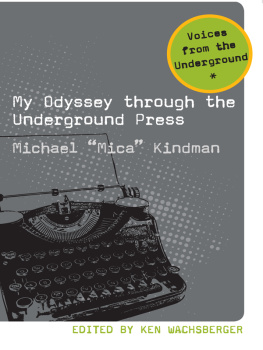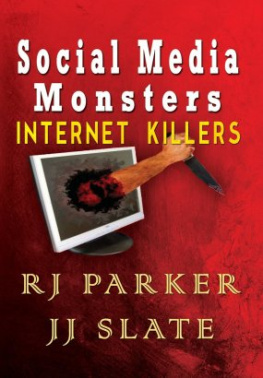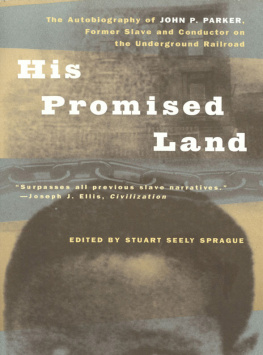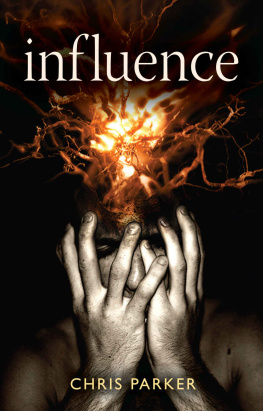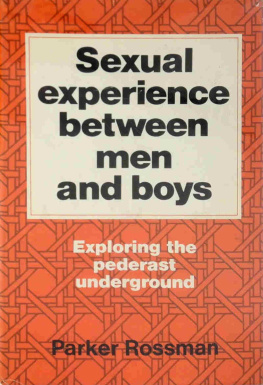Emily Parker - Now I Know Who My Comrades Are: Voices from the Internet Underground
Here you can read online Emily Parker - Now I Know Who My Comrades Are: Voices from the Internet Underground full text of the book (entire story) in english for free. Download pdf and epub, get meaning, cover and reviews about this ebook. year: 2014, publisher: Sarah Crichton Books, genre: Art. Description of the work, (preface) as well as reviews are available. Best literature library LitArk.com created for fans of good reading and offers a wide selection of genres:
Romance novel
Science fiction
Adventure
Detective
Science
History
Home and family
Prose
Art
Politics
Computer
Non-fiction
Religion
Business
Children
Humor
Choose a favorite category and find really read worthwhile books. Enjoy immersion in the world of imagination, feel the emotions of the characters or learn something new for yourself, make an fascinating discovery.

- Book:Now I Know Who My Comrades Are: Voices from the Internet Underground
- Author:
- Publisher:Sarah Crichton Books
- Genre:
- Year:2014
- Rating:5 / 5
- Favourites:Add to favourites
- Your mark:
- 100
- 1
- 2
- 3
- 4
- 5
Now I Know Who My Comrades Are: Voices from the Internet Underground: summary, description and annotation
We offer to read an annotation, description, summary or preface (depends on what the author of the book "Now I Know Who My Comrades Are: Voices from the Internet Underground" wrote himself). If you haven't found the necessary information about the book — write in the comments, we will try to find it.
Emily Parker: author's other books
Who wrote Now I Know Who My Comrades Are: Voices from the Internet Underground? Find out the surname, the name of the author of the book and a list of all author's works by series.
Now I Know Who My Comrades Are: Voices from the Internet Underground — read online for free the complete book (whole text) full work
Below is the text of the book, divided by pages. System saving the place of the last page read, allows you to conveniently read the book "Now I Know Who My Comrades Are: Voices from the Internet Underground" online for free, without having to search again every time where you left off. Put a bookmark, and you can go to the page where you finished reading at any time.
Font size:
Interval:
Bookmark:
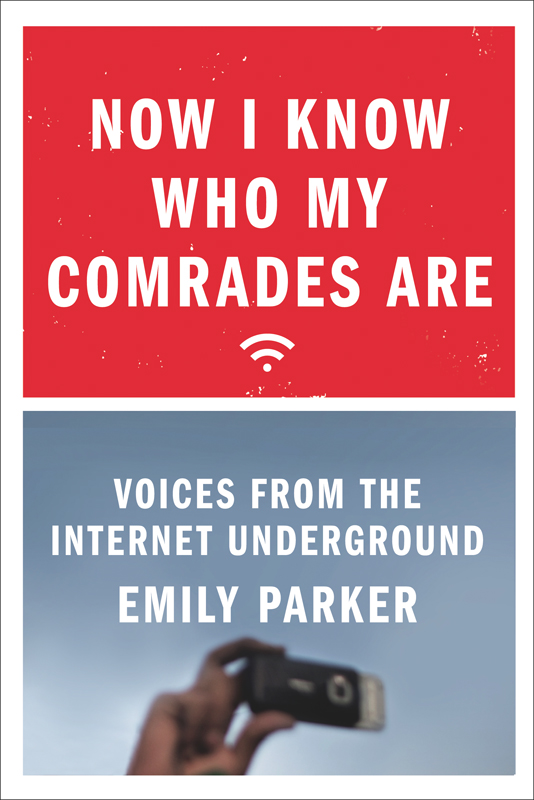
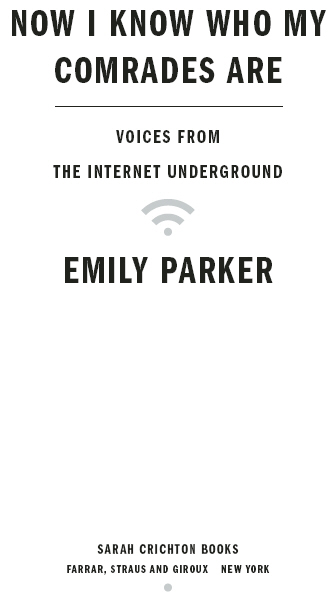
The author and publisher have provided this e-book to you for your personal use only. You may not make this e-book publicly available in any way. Copyright infringement is against the law. If you believe the copy of this e-book you are reading infringes on the authors copyright, please notify the publisher at: us.macmillanusa.com/piracy.
For my parents
CONTENTS
INTRODUCTION
THE STORY WE MISSED IN EGYPT
In 2011, ordinary Egyptians, many armed with little more than social media, helped topple a thirty-year dictatorship in eighteen days. But Egypts real online revolution began years before. During the darkest hours of the Hosni Mubarak regime, when much of Egyptian society had essentially given up on political change, radically different citizens were emerging. They came to life on the Internet, which was the closest you could get to a free space. These citizens were fearless, densely networked, and ready to fight. And when Egypt was finally ready for revolution, these were the people who were poised to lead the way.
So why didnt anyone see it coming? In November 2010, a mere two months before revolution broke out, Reuters published an article headlined Egypt Dissent Yet to Get from Facebook to the Streets. It said that social media was unlikely to provoke real change in Egypt. This reflected the conventional wisdom at the time. By late 2010 the idea of social media revolutions was out of vogue. Excitement over Irans 2009 so-called Twitter Revolution was hard to maintain when Iranian authorities had basically snuffed out the protest movement.
As Internet dissent spread, repressive governments ramped up their attempts to rein it in. They censored words, blocked websites, arrested bloggers, and surveilled dissidents. Commentators mocked the idea that social media could pave the way for revolution. A vibrant online community, the theory went, would not change bleak off-line realities.
But such critics underestimated the psychological impact of the Internet in Egypt in the years leading up to the revolution. Change begins with individuals. Over the years, blogs and social media helped to transform cowed, powerless individuals into revolutionaries.
In the years leading up to 2011, Egypts off-line life was bleak. The country had been living under emergency law since 1981, when Anwar Sadat was assassinated and Hosni Mubarak took power. The law severely restricted freedom of speech and assembly, and it afforded the police limitless powers. Dissidents risked arrest or torture by the state security services.
This all took a severe psychological toll. Many Egyptians were terrified of criticizing the government in public, let alone of forming a viable opposition force. Almost all broadcast and print media were controlled or owned by the Mubarak government or the ruling National Democratic Party. Worst of all, there was little reason to believe that anything would change. Mubarak had tenaciously held on to power for three decades, and elections were widely perceived as neither free nor fair. Faced with their apparently immutable fate, many Egyptians withdrew from politics.
Although Egyptian authorities targeted individual bloggers, they didnt seem to see the Web as a serious threat. Thus, the Internet offered possibilities that didnt exist in real life. When state media presented a distorted version of reality, bloggers reported on events themselves. They took photographs and posted videos on YouTube. They fiercely debated, signed petitions, and organized street demonstrations.
The now famous We Are All Khaled Said Facebook page, named after a blogger who was beaten to death by police, played a key role in organizing the January 25, 2011, protests. But the ability to mobilize citizens via social media did not materialize overnight. Previous Internet campaigns helped build networks and trust. In a country where you needed a permit to gather more than five people, tens of thousands of individuals were joining forces online. In 2009 Rasha Abdulla, a professor at the American University in Cairo, described such sites as Facebook as virtual nations, a place where members can roam freely without worrying about the restrictions their own countries and political systems might be imposing on them.
On the Internet, ordinary Egyptians began to overcome the isolation, fear, and apathy that are the lifeblood of authoritarian regimes.
ISOLATION, FEAR, AND APATHY
Most authoritarian regimes would not survive a sustained mass uprising. Lucky for them, such uprisings may never come to pass. Their populations are too paralyzed by various psychological obstacles, which in turn are deftly manipulated by authorities. The first is isolation. Regimes will strive to isolate potential dissenters from one another, both physically and psychologically. Those who dont agree with the party line feel powerless and alone. When protests are small and scattershot, they are both ineffective and dangerous for those involved. Its much easier for authorities to target a few dissidents, as opposed to a large crowd.
The second obstacle is fear. People are scared that if they dissent, they could lose their livelihoods or even go to jail. Networks of citizen informers lead people to fear one another, and society is flooded with risk aversion and distrust. A population that is crippled by paranoia, distrust of neighbors, and fear of state reprisals is not likely to band together in protest.
The third obstacle is apathy, an authoritarian governments best protection. Apathy often sets in once fear and isolation have done their damage. It may appear as if the average citizen doesnt care about politics or is more concerned about his daily bread, but often people dont protest because they have nothing to protest for. The state has marginalized potential opposition so effectively that the ruling regime truly looks like the best option. If there are no viable alternatives, and demonstrations are dangerous and wont change anything anyway, then whats the point? So people stay home.
Isolation, fear, and apathy keep authoritarian regimes in power. So what happens when people overcome these feelings? Governments can manipulate mass psychology to a certain degree, but when that stops working, their regimes are in serious trouble. As Gene Sharp wrote in his seminal work From Dictatorship to Democracy , even dictators require the assistance of the people they rule, and the degree of liberty or tyranny in any government is largely a reflection of the relative determination of the subjects to be free.
THE NEW CITIZENS OF THE WEB
Repressive governments have long tried to control the spread of information, and ordinary citizens have long used creative ways to get around these controls. In eighteenth-century France, people criticized King Louis XV by spreading poems that were copied on pieces of paper or set to the tunes of popular songs. In the early 1980s, workers in Soviet-era Poland spread news via mimeographs and cassette tapes. Technological progress has only increased the breadth and speed of this phenomenon. As Albert Wohlstetter said in his 1990 speech The Fax Shall Make You Free, isolating and suppressing dissidents are incompatible with using decentralizing information technologies.
The same is true about the Internet, only on a much grander scale. In China, there are hundreds of millions of wangmin , or netizens, which is another way of saying citizens of the Web. And these are very different kinds of citizens. They are surrounded, at least virtually, by like-minded individuals. They learn the power of collective action. They become parts of networks that extend outside their countrys borders. This affords some protection: Once, authorities could simply make troublemakers disappear. Now they face the wrath of domestic public opinion or even the rebukes of the outside world.
Font size:
Interval:
Bookmark:
Similar books «Now I Know Who My Comrades Are: Voices from the Internet Underground»
Look at similar books to Now I Know Who My Comrades Are: Voices from the Internet Underground. We have selected literature similar in name and meaning in the hope of providing readers with more options to find new, interesting, not yet read works.
Discussion, reviews of the book Now I Know Who My Comrades Are: Voices from the Internet Underground and just readers' own opinions. Leave your comments, write what you think about the work, its meaning or the main characters. Specify what exactly you liked and what you didn't like, and why you think so.




